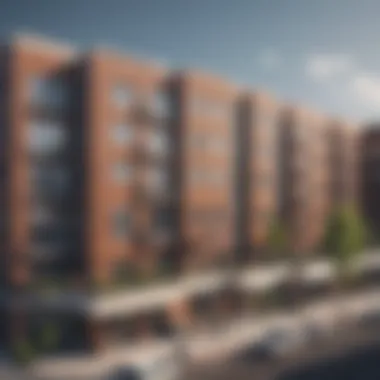Elevating Efficiency in Apartment Complex Property Management: A Detailed Guide


Industry Overview
Currently, the apartment complex property management sector is experiencing significant growth globally due to the rise in urbanization and the increased demand for rental housing. The dynamics of this industry are continually evolving, with technology playing a pivotal role in reshaping how property managers operate. As property management becomes increasingly complex, software solutions tailored to the industry are becoming essential tools for optimizing operational efficiency and enhancing tenant satisfaction.
Current Trends in the Industry-specific Software Market
In the realm of apartment complex property management, the software market is witnessing a surge in specialized solutions designed to streamline day-to-day operations, from lease management to maintenance requests. Cloud-based platforms are gaining traction for their accessibility and scalability, while integrated systems that offer a holistic view of property performance are becoming a standard requirement for modern property managers. Keeping abreast of the latest software trends is crucial for staying competitive in a rapidly evolving landscape.
Key Challenges Faced by Buyers in the Industry
One of the primary challenges for property managers seeking software solutions is navigating the array of options available in the market. Understanding the specific needs of their properties, such as unit size, number of tenants, and financial constraints, is essential for selecting a software solution that aligns with their requirements. Additionally, integrating new software with existing legacy systems can present compatibility issues, emphasizing the importance of thorough research and planning before making a purchasing decision.
Emerging Technologies Impacting the Industry
The integration of emerging technologies like artificial intelligence (AI) and Internet of Things (Io T) is revolutionizing apartment complex property management. AI-driven predictive analytics can optimize decision-making processes, such as rental pricing and preventive maintenance scheduling, while IoT devices enable real-time monitoring of property conditions for proactive problem-solving. By leveraging these technologies, property managers can enhance operational efficiency, reduce costs, and improve overall tenant experiences.
Introduction
Apartment complex property management is a multifaceted domain that demands meticulous attention to detail and strategic oversight. In the realm of real estate, the effective management of apartment complexes is crucial for ensuring tenant satisfaction, optimizing operational efficiency, and enhancing overall property value. This comprehensive guide delves deep into the intricacies of apartment complex property management, offering invaluable insights and expert strategies for property managers looking to elevate their management practices in a competitive market landscape.
Throughout this article, we will explore a range of topics crucial for successful property management, from understanding the key responsibilities of property managers to implementing effective tenant relations strategies and maintenance protocols. By focusing on these fundamental aspects, property managers can navigate the complex nuances of the real estate industry with finesse and professionalism.
Understanding Apartment Complex Property Management
Understanding Apartment Complex Property Management is paramount in the realm of property management. This informative guide sheds light on the intricacies and nuances of overseeing residential complexes. It delves into the core principles that govern the effective supervision of apartment buildings, highlighting the pivotal role property managers play in ensuring smooth operations and tenant satisfaction. By unraveling the complexities of Apartment Complex Property Management, professionals in the real estate sector can gain valuable insights that can significantly enhance their management strategies and elevate the overall performance of their properties.
Defining Apartment Complex Property Management
Defining Apartment Complex Property Management involves a multifaceted approach to the supervision and maintenance of residential buildings. It encompasses a comprehensive set of tasks and responsibilities aimed at preserving the quality of life for tenants, safeguarding the structural integrity of the property, and maximizing returns for property owners. Property managers act as the frontline guardians of these complexes, overseeing everything from leasing and rent collection to maintenance and tenant relations. Their role is pivotal in ensuring the seamless operation of apartment buildings while upholding high standards of living for residents.
Key Responsibilities of Property Managers


The responsibilities of property managers extend far beyond mere administrative tasks. They are entrusted with a myriad of crucial duties, including lease management, tenant screening, property maintenance, and financial oversight. Property managers serve as the primary point of contact for tenants, addressing their concerns, resolving issues, and fostering positive relationships within the community. They must also stay abreast of local housing regulations, handle emergency situations effectively, and optimize operational efficiency to deliver a superior living experience for residents.
Challenges in Apartment Complex Management
Managing apartment complexes poses a unique set of challenges that require adept problem-solving skills and strategic foresight. From handling tenant disputes and maintenance backlogs to navigating regulatory frameworks and budget constraints, property managers face a myriad of obstacles in ensuring the seamless operation of residential properties. The dynamic nature of real estate markets, coupled with evolving tenant expectations, demands agile and innovative approaches to address these challenges effectively. By proactively identifying and mitigating potential hurdles, property managers can enhance the overall resilience and sustainability of apartment complexes.
Effective Strategies for Tenant Relations
Effective tenant relations are a cornerstone of successful apartment complex property management. As property managers, fostering positive relationships with tenants is imperative for tenant retention, satisfaction, and overall operational efficiency. By prioritizing tenant relations, property managers can create a harmonious living environment and mitigate potential conflicts.
Implementing effective strategies for tenant relations involves establishing clear communication channels, resolving tenant issues promptly, and implementing tenant feedback mechanisms. These strategies not only enhance tenant satisfaction but also contribute to a positive reputation for the property among residents and prospective tenants.
Establishing Clear Communication Channels
Clear and transparent communication channels are essential for fostering a harmonious relationship between property managers and tenants. By establishing open lines of communication, property managers can address tenant concerns, provide timely updates on maintenance issues, and ensure that residents feel heard and valued. Effective communication fosters trust and understanding, laying the foundation for a positive tenant-manager relationship.
Utilizing various communication tools such as email, resident portals, and in-person meetings can help property managers ensure that information reaches tenants in a timely and efficient manner. Regular updates on property developments, upcoming events, and policy changes can help maintain clear communication and prevent misunderstandings.
Maintaining accessibility and responsiveness to tenant inquiries and feedback is crucial for building trust and demonstrating a commitment to tenant satisfaction. Property managers should be proactive in addressing tenant questions and concerns, fostering an environment of open dialogue and mutual respect.
Resolving Tenant Issues Promptly
Timely resolution of tenant issues is paramount in maintaining tenant satisfaction and upholding the value of the property. Property managers should prioritize addressing tenant concerns promptly to prevent escalation and ensure that residents are living in comfortable and well-maintained units.
Establishing efficient protocols for addressing maintenance requests, property-related inquiries, and lease compliance issues is crucial for streamlining issue resolution. By promptly responding to tenant issues, property managers can demonstrate their dedication to tenant well-being and satisfaction.
Implementing a system for tracking and prioritizing tenant issues can help property managers allocate resources effectively and address urgent matters in a timely manner. By being proactive and responsive in resolving tenant problems, property managers can foster a positive relationship with residents and instill confidence in the property management team.
Implementing Tenant Feedback Mechanisms
Incorporating tenant feedback mechanisms is vital for gathering valuable insights into tenant satisfaction, preferences, and concerns. By soliciting feedback from residents through surveys, suggestion boxes, or virtual communication platforms, property managers can gain actionable data to improve the overall living experience for tenants.


Analyzing and acting upon tenant feedback demonstrates a commitment to continuous improvement and tenant-centric management practices. Property managers can use feedback to identify areas for enhancement, address recurring issues, and implement changes that align with tenant expectations.
Creating a culture of feedback and responsiveness can empower tenants to voice their opinions and actively participate in shaping their living environment. Property managers who prioritize implementing tenant feedback mechanisms show a willingness to adapt and evolve based on resident input, fostering a collaborative and mutually beneficial relationship with tenants.
Maintenance Protocols and Asset Management
In the realm of apartment complex property management, maintenance protocols and asset management play a pivotal role in ensuring the seamless operation and longevity of residential properties. This crucial aspect encompasses a range of duties related to the upkeep and preservation of the physical infrastructure, as well as the strategic management of valuable assets within the complex. By adhering to rigorous maintenance protocols and implementing effective asset management strategies, property managers can significantly enhance the overall quality of living for residents while safeguarding the long-term value and sustainability of the property. The meticulous planning and execution of maintenance tasks, coupled with astute asset management practices, are indispensable for maintaining a competitive edge in the real estate market.
Developing Preventive Maintenance Plans
Developing preventive maintenance plans is a cornerstone of proactive property management, aimed at preventing costly repairs, minimizing disruptions, and prolonging the lifespan of building components. By formulating comprehensive schedules for routine inspections, maintenance activities, and equipment servicing, property managers can detect and address potential issues before they escalate into major problems. This proactive approach not only ensures the continuous functionality of key systems and components but also fosters a safe and comfortable environment for tenants. Moreover, preventive maintenance plans can contribute to cost savings in the long run by averting emergency repairs and preserving the property's overall appeal and value.
Managing Vendor Relationships Effectively
Effective vendor management is essential for ensuring timely and quality services across various maintenance and repair tasks within an apartment complex. Property managers need to cultivate strong partnerships with reliable vendors, contractors, and suppliers to guarantee prompt responsiveness, competitive pricing, and superior workmanship. By establishing clear communication protocols, delineating expectations, and fostering collaborative relationships with vendors, property managers can streamline maintenance processes, expedite problem resolution, and deliver exceptional service to tenants. Maintaining positive vendor relationships not only enhances operational efficiency but also reinforces the reputation of the property as a well-maintained and desirable living environment.
Optimizing Asset Performance and Longevity
Optimizing asset performance and longevity is a strategic imperative for property managers seeking to maximize the return on investment and extend the lifespan of critical assets. By implementing proactive maintenance strategies, conducting regular performance assessments, and leveraging data-driven insights, property managers can enhance the efficiency, durability, and functionality of key assets within the complex. Additionally, the adoption of preventive measures, such as equipment upgrades, energy-efficient solutions, and predictive maintenance technologies, can contribute to cost savings, improved tenant satisfaction, and increased asset value. Prioritizing asset optimization not only signifies a commitment to excellence in property management but also lays the foundation for sustainable growth and success in the competitive real estate landscape.
Financial Management and Budgeting
Financial management and budgeting play a vital role in the successful operation of an apartment complex. In the realm of property management, having a solid grasp of financial concepts and the ability to effectively allocate funds is paramount. It is crucial for property managers to meticulously plan budgets to ensure the seamless running of day-to-day operations and the execution of long-term strategies. Apart from monitoring income and expenditures, financial management also involves forecasting future expenses, identifying areas for cost optimization, and maximizing revenue streams. By implementing robust financial management practices, property managers can maintain financial stability, enhance investment returns, and sustain the overall health of the property.
Budget Planning and Allocation
Budget planning and allocation are fundamental components of financial management for apartment complexes. Property managers need to meticulously plan and allocate budgets to cover various expenses such as maintenance, repairs, upgrades, and operational costs. Creating a detailed budget that accounts for all foreseeable expenses allows for better financial control and minimizes the risk of overspending. Effective budget planning ensures that funds are allocated appropriately to different aspects of property management, enabling the smooth functioning of the apartment complex while also accommodating potential unforeseen costs that may arise. By aligning budget allocation with strategic priorities and financial goals, property managers can enhance operational efficiency and drive long-term financial sustainability.
Expense Tracking and Cost Optimization
Expense tracking and cost optimization are integral to maintaining financial health and maximizing profitability in apartment complex management. Property managers must diligently monitor expenses, identify cost-saving opportunities, and streamline operational processes to minimize unnecessary expenditures. By leveraging data analytics and financial reporting tools, managers can gain insights into spending patterns, pinpoint areas of high expenditure, and implement strategies to optimize costs without compromising on the quality of services provided to tenants. Additionally, expense tracking facilitates better decision-making by allowing managers to prioritize investments that yield the highest returns and align expenditures with revenue-generating activities.


Revenue Generation Strategies
Developing effective revenue generation strategies is essential for sustaining and enhancing the financial performance of an apartment complex. Property managers can explore various avenues to increase revenue, such as optimizing rental pricing, attracting high-quality tenants, and expanding ancillary services. By conducting market research, analyzing competitive rental rates, and enhancing tenant satisfaction, managers can capitalize on revenue opportunities and maximize rental income. Implementing innovative revenue generation strategies not only strengthens the financial position of the property but also fosters long-term growth and competitiveness in the real estate market.
Compliance and Legal Considerations
In the realm of apartment complex property management, Compliance and Legal Considerations hold a paramount importance, shaping the landscape within which property managers operate. Ensuring adherence to regulatory frameworks and legal requirements is not just a matter of box-ticking; it is a strategic imperative that mitigates risks and fosters trust with tenants and stakeholders. By proactively addressing Compliance and Legal Considerations, property managers can safeguard the reputation of the property, navigate potential legal pitfalls, and demonstrate a commitment to operating ethically and professionally.
Ensuring Regulatory Compliance
Central to the successful operation of an apartment complex is the meticulous attention to achieving Regulatory Compliance. This involves adhering to a myriad of laws, ordinances, and industry standards that govern property management activities. By meticulously following these regulations, property managers can avoid costly penalties, legal entanglements, and reputational damage.
Navigating Property Laws and Regulations
Navigating the intricate web of Property Laws and Regulations demands a comprehensive understanding of the legal framework pertinent to real estate management. Property managers must stay abreast of local, state, and federal laws governing property ownership, rental agreements, tenant rights, and landlord responsibilities. By staying informed and compliant, property managers can ensure smooth operations and foster positive tenant relationships.
Risk Management Strategies
In the realm of property management, Risk Management Strategies play a pivotal role in protecting assets and optimizing operational resilience. By identifying potential risks, whether they be related to legal liability, property damage, or financial exposure, property managers can implement preemptive measures to mitigate these risks effectively. Robust risk management strategies not only safeguard the financial health of the property but also instill confidence in stakeholders and investors, positioning the property for long-term sustainability and success.
Technology Integration for Enhanced Management
In the realm of apartment complex property management, technology integration plays a pivotal role in enhancing operational efficiency and streamlining various processes. Property managers today are increasingly relying on advanced software solutions and technological tools to optimize their management strategies. By incorporating modern technology into property management practices, managers can effectively monitor, track, and oversee different aspects of property operations. From facilitating online rent payments to automating maintenance requests, technology integration revolutionizes the way apartment complexes are managed.
Utilizing Property Management Software
Property management software stands out as a cornerstone of efficient property management. Such software enables property managers to centralize essential data, streamline communication with tenants, track maintenance requests, and monitor financial transactions effectively. With features like automated rent collection, tenant portals for communication, and maintenance ticketing systems, property management software simplifies complex tasks, reduces manual errors, and enhances overall operational productivity.
Incorporating Smart Solutions for Efficiency
The integration of smart solutions into apartment complex management fosters a more connected and responsive environment. Smart devices such as Io T sensors, smart locks, and energy-efficient systems not only enhance convenience for tenants but also improve operational efficiency for property managers. Implementing smart solutions can lead to reduced energy consumption, proactive maintenance alerts, and enhanced security measures, ultimately creating a more sustainable and modern living experience for residents.
Data Analytics for Informed Decision-Making
Data analytics plays a crucial role in shaping informed decision-making processes within apartment complex management. By leveraging data analytics tools, property managers can gain valuable insights into tenant behavior, operational trends, and financial performance. Analyzing data related to occupancy rates, rental trends, and maintenance costs empowers managers to make data-driven decisions that optimize resource allocation, enhance tenant satisfaction, and maximize overall property performance.
Conclusion
In the vast landscape of property management, the \



